Results 41 to 80 of 81
-
09-10-2004, 12:38 PM #41
yeah that one is cool as hell! where's the joint???
-
09-10-2004, 06:02 PM #42
This pic for some reason gives me a unplesant feeling. Its beautifull no doubt about it but it looks scary in some way
 Does anyone else get the same reaction?
Does anyone else get the same reaction?
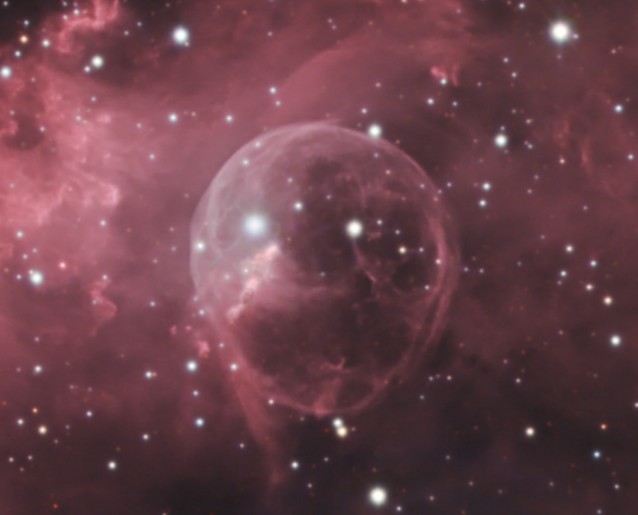
-
09-10-2004, 07:20 PM #43
OHH SO CUTE~
-
09-10-2004, 08:04 PM #44
 Junior Member
Junior Member

- Join Date
- Jun 2004
- Location
- FL
- Posts
- 93
What is that last one of? A super nova?
fpot66
-
09-11-2004, 05:44 AM #45Nope its a dog
 Originally Posted by Fpot66
Originally Posted by Fpot66

to be serious here is the nasa explanation to the bubble
Explanation: Blown by the wind from a star, this tantalizing, ghostly apparition is cataloged as NGC 7635, but known simply as The Bubble Nebula. Astronomer Ken Crawford's striking view combines a long exposure through a hydrogen alpha filter with color images to reveal the intricate details of this cosmic bubble and its environment. Although it looks delicate, the 10 light-year diameter bubble offers evidence of violent processes at work. Seen here above and left of the Bubble's center is a bright hot star embedded in telltale blue hues characteristic of dust reflected starlight. A fierce stellar wind and intense radiation from the star, which likely has a mass 10 to 20 times that of the Sun, has blasted out the structure of glowing gas against denser material in a surrounding molecular cloud. The intriguing Bubble Nebula lies a mere 11,000 light-years away toward the boastful constellation Cassiopeia.
-
09-11-2004, 12:50 PM #46
real cool bro
-
09-11-2004, 05:46 PM #47
This pic **** near knocked the breath out of me.
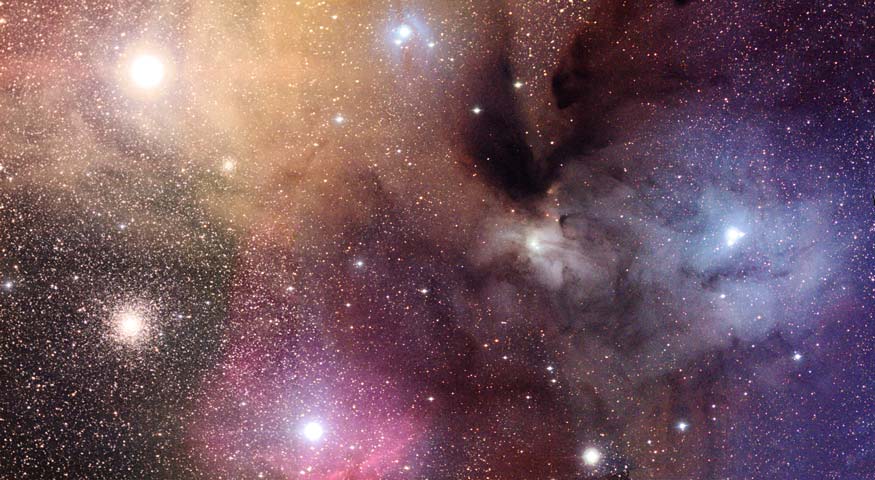
-
09-13-2004, 05:02 AM #48
Gonna keep this thread alive as long as I can

this is a BADASS pic from iceland
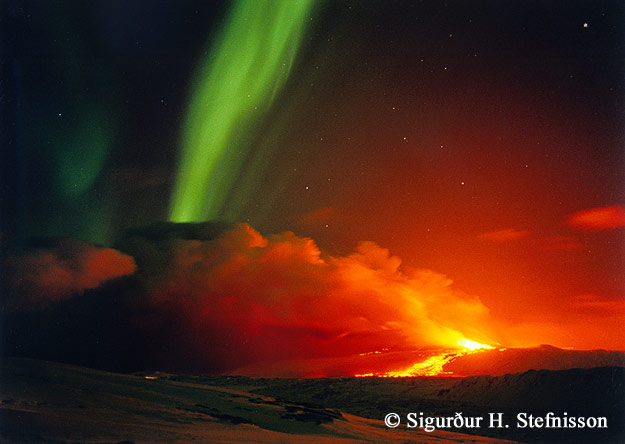
-
10-14-2004, 10:19 AM #49
Sweet pic. Caught it a little late. Keep em coming bro.
-
10-14-2004, 10:28 AM #50
that is just amazing. it makes you feel insignificant when you are reminded how large the universe is and how you are one person on a planet of billions, and there are billions-trillions-who knows how many other planets in the universe. there has got to be intelligent life somewhere else.
-
10-14-2004, 11:52 AM #51
bump. nasa pics are the best hands down. i spend hours on the archives sometimes
-
10-14-2004, 12:44 PM #52sure thing
 Originally Posted by FinaZurp
Originally Posted by FinaZurp

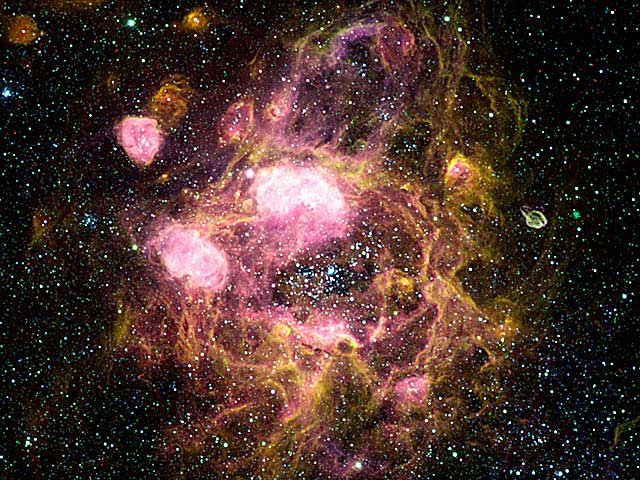
-
10-14-2004, 12:46 PM #53
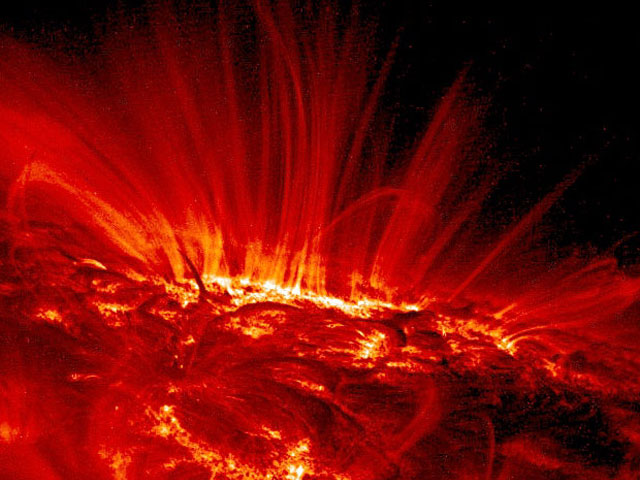
-
10-14-2004, 01:22 PM #54
Yeah I'm fascinated by these pictures. One of the ones you have above is a star nursery, where new stars are born. I think it's like a trillion light years across or some sh*t. ****ing awesome. We are such a small nothing in the big picture...
-
10-14-2004, 02:03 PM #55Glad Im not the only one. Now I feel a little less like a nerd
 Originally Posted by symatech
Originally Posted by symatech

-
10-14-2004, 02:45 PM #56Well feel like even less of a nerd...Im on there all the time too bro.
 Originally Posted by johan
Originally Posted by johan
-
10-15-2004, 10:57 AM #57
here you go bro, a few more to add

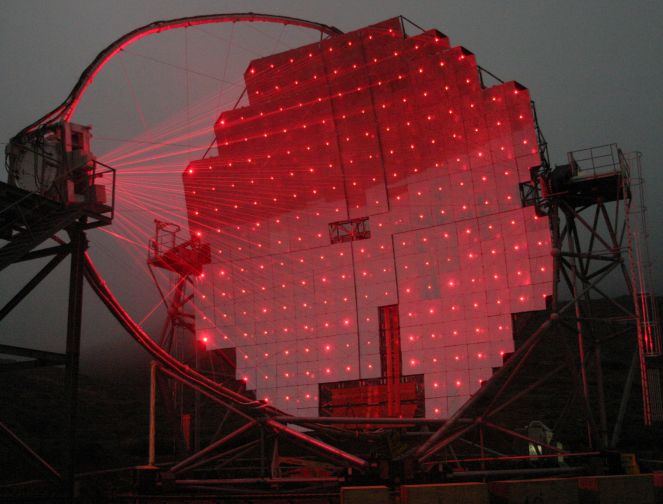
-
10-15-2004, 11:00 AM #58
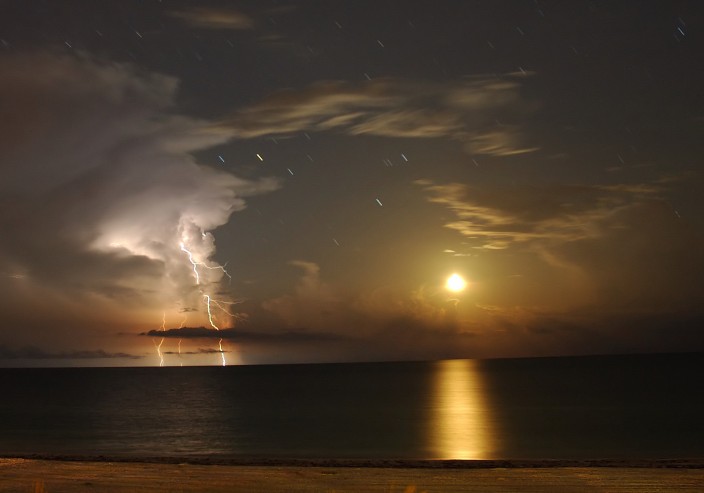
not really space but still quite stunning
-
10-15-2004, 11:02 AM #59
That last one was incredibly beautifull
-
10-15-2004, 11:12 AM #60
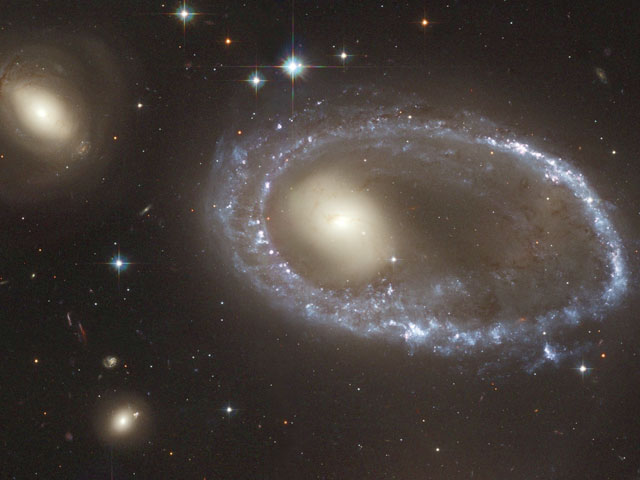
Explanation: How could a galaxy become shaped like a ring? The rim of the blue galaxy pictured on the right is an immense ring-like structure 150,000 light years in diameter composed of newly formed, extremely bright, massive stars. That galaxy, AM 0644-741, is known as a ring galaxy and was caused by an immense galaxy collision. When galaxies collide, they pass through each other -- their individual stars rarely come into contact. The ring-like shape is the result of the gravitational disruption caused by an entire small intruder galaxy passing through a large one. When this happens, interstellar gas and dust become condensed, causing a wave of star formation to move out from the impact point like a ripple across the surface of a pond. The intruder galaxy has since moved out of the frame taken by the Hubble Space Telescope and released to commemorate last Saturday's fourteenth anniversary of Hubble's launch. Ring galaxy AM 0644-741 lies about 300 million light years away.
-
10-15-2004, 11:16 AM #61
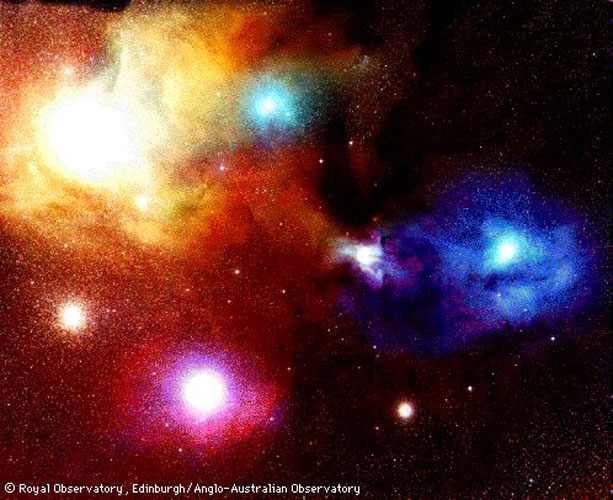
amazing colours
-
10-15-2004, 11:21 AM #62
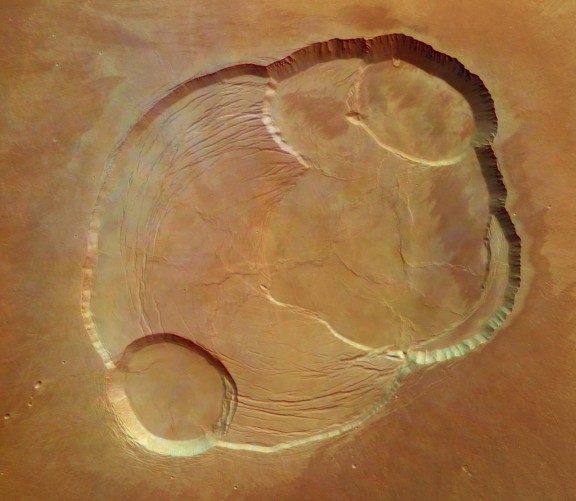
At the Summit of Olympus Mons
Credit: G. Neukum (FU Berlin) et al., DLR, ESA
Explanation: From martian orbit, the Mars Express cameras looked down on the largest volcano in the solar system. The result was this stunningly detailed overhead view of the caldera or summit crater region of Olympus Mons. Fittingly named for the lofty abode of the gods of Greek mythology, Olympus Mons rises 21 kilometers above the surrounding plain or to about 3 times the height of Mt. Everest. The area pictured is 102 kilometers across and the caldera pits are up to 3 kilometers deep. For comparison, hawaiian volcanic calderas range up to 18 kilometers in diameter. Outlined by steep cliffs, Olympus Mons itself is about 600 kilometers in diameter.
-
10-15-2004, 11:23 AM #63
Sweet.
-
10-15-2004, 12:29 PM #64
isnt all the stars the arrows are pointing at reflections of the same star? likewise with the large white masses?
-
10-15-2004, 12:59 PM #65
eagle nebula is the best by far
-
10-15-2004, 02:06 PM #66err no
 Originally Posted by SickNasty
Originally Posted by SickNasty
-
10-15-2004, 03:11 PM #67
Nice pics
-
07-28-2005, 05:28 PM #68
reviving a old thread with a new pic I just found

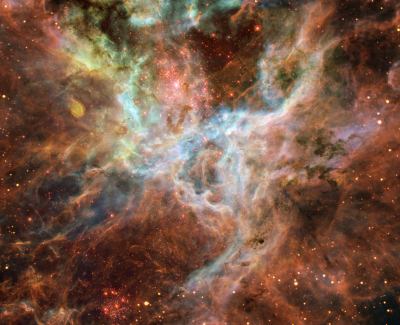
BIG version can be found here
http://esamultimedia.esa.int/images/...e20041215a.jpg
-
07-28-2005, 06:32 PM #69
Nice pic bro, thank you for sharing
-
07-28-2005, 08:29 PM #70
 Anabolic Member
Anabolic Member

- Join Date
- Jul 2005
- Location
- Miami
- Posts
- 2,841
Absolutely amazing!. Like someone said before, our lives seem so small compared to the infinite universe. When I see pics like these, I attempt to contemplate the ununderstandable and it can drive me mad if I let it.
-
07-28-2005, 08:38 PM #71
 Anabolic Member
Anabolic Member

- Join Date
- Oct 2001
- Posts
- 3,723
Space has always been somthing else to me.
Very intresting, I can't help but watch anything involving it on the television.
I would think in our live times we will learn much more. People are figuring out the age process and learning to slow it down. There have been drugs adminstered to earth worms (who have very similar DNA to humans belive it or not) that has increased thier life span by 7 times!
Imagine now if Albert E. lived to be 500 years old? IMO for the first 30-40 years of our lives we are learning to be experts in what ever it is we do. We then retire or quit doing what ever that is when we are 60 so we have a 20 year window to accomplish great things.
As we get more involved with space, i hope we can some how figure out if it ever ends, if it is infinte or if there is another univierse.
Maybe our brains just cannot comprehend the infinite? Physics has proven there are certain things we cannot comprehend. I guess it would be kind of like a animal not being able to speak or use tools, they just can't comprehend what they are for.
god, intresting stuff
-
07-28-2005, 08:43 PM #72
Johan that is absofrigginlutely amazing
das ist wunderbar mein Freund
es warmt mein Hertz
-
07-28-2005, 09:11 PM #73
 Associate Member
Associate Member

- Join Date
- May 2005
- Posts
- 286
wow those are amazing, Im always facinated with the universe, Do you guys know of ne good books or any thing about theory of space??
-
07-29-2005, 04:36 AM #74
Navy Lt. Ron Candiloro's F/A-18 Hornet creates a shock wave as he breaks the sound barrier July 7. The shock wave is visible as a large cloud of condensation formed by the cooling of the air. A smaller shock wave can be seen forming on top of the canopy.
It is possible for a skilled pilot to work the plane's throttle to move the shock wave forward or aft.
Candiloro is assigned to Fighter Squadron 151, currently deployed with the USS Constellation battle group. (U.S. Navy photo by Ensign John Gay)

-
07-29-2005, 04:37 AM #75
Picture of our nearesr galaxy, Andromeda
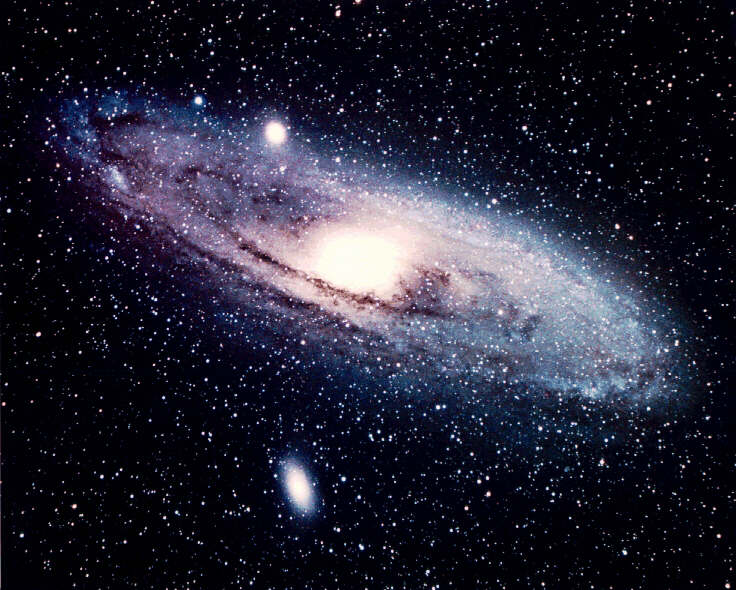
-
07-29-2005, 04:40 AM #76
From ground-based telescopes, the so-called "ant nebula" (Menzel 3, or Mz3) resembles the head and thorax of a garden-variety ant. This dramatic NASA/ESA Hubble Space Telescope image, showing 10 times more detail, reveals the "ant's" body as a pair of fiery lobes protruding from a dying, Sun-like star.
The Hubble images directly challenge old ideas about the last stages in the lives of stars. By observing Sun-like stars as they approach their deaths, the Hubble Heritage image of Mz3 -- along with pictures of other planetary nebulae -- shows that our Sun's fate probably will be more interesting, complex, and striking than astronomers imagined just a few years ago.
Though approaching the violence of an explosion, the ejection of gas from the dying star at the center of Mz3 has intriguing symmetrical patterns unlike the chaotic patterns expected from an ordinary explosion. Scientists using Hubble would like to understand how a spherical star can produce such prominent, non-spherical symmetries in the gas that it ejects.
One possibility is that the central star of Mz3 has a closely orbiting companion that exerts strong gravitational tidal forces, which shape the outflowing gas. For this to work, the orbiting companion star would have to be close to the dying star, about the distance of the Earth from the Sun. At that distance the orbiting companion star wouldn't be far outside the hugely bloated hulk of the dying star. It's even possible that the dying star has consumed its companion, which now orbits inside of it, much like the duck in the wolf's belly in the story "Peter and the Wolf." (See http://oposite.stsci.edu/pubinfo/qt/ssudec.mov for an animation that shows how this might work.)
A second possibility is that, as the dying star spins, its strong magnetic fields are wound up into complex shapes like spaghetti in an eggbeater. Charged winds moving at speeds up to 1000 kilometers per second from the star, much like those in our sun's solar wind but millions of times denser, are able to follow the twisted field lines on their way out into space. These dense winds can be rendered visible by ultraviolet light from the hot central star or from highly supersonic collisions with the ambient gas that excites the material into florescence.
No other planetary nebula observed by Hubble resembles Mz3 very closely. M2-9 comes close, but the outflow speeds in Mz3 are up to 10 times larger than those of M2-9. (See http://oposite.stsci.edu/pubinfo/PR/...ent/9738aw.jpg). Interestingly, the very massive, young star, Eta Carinae, shows a very similar outflow pattern (see http://oposite.stsci.edu/pubinfo/PR/96/23.html).
Astronomers Bruce Balick (University of Washington) and Vincent Icke (Leiden University) used Hubble to observe this planetary nebula, Mz3, in July 1997 with the Wide Field Planetary 2 camera. One year later, astronomers Raghvendra Sahai and John Trauger of the Jet Propulsion Lab in California snapped pictures of Mz3 using slightly different filters. This intriguing image, which is a composite of several filters from each of the two datasets, was created by the Hubble Heritage Team.
-
07-29-2005, 04:51 AM #77
since many of these pics can be found with VERY high resolution at ESA. How would I go about making them into posters if Id like to? Many of the pics here I would like on my walls at home.
The 20 year window is kind of good in a way. It makes new ideas constantly get into science when old ones go away. If we had lived for 500 years I bet newtonian and maxwell physics would still be the most advanced we have since the old timers wouldnt have accepted any new ideas. Originally Posted by J-Dogg
Originally Posted by J-Dogg
-
07-29-2005, 10:36 AM #78
Cool pics some tripy sh*t.
-
07-29-2005, 10:41 AM #79
If I had a shitload of money, I think it would be badass to get married in space!! Picture that shit, the first couple to get married on the ****ing moon!!! Just gotta hold your breath when you kiss each other, but it would def go down in history!!
-
08-01-2005, 06:54 PM #80your jokin right
 Originally Posted by stayinstacked
Originally Posted by stayinstacked
Thread Information
Users Browsing this Thread
There are currently 1 users browsing this thread. (0 members and 1 guests)



 LinkBack URL
LinkBack URL About LinkBacks
About LinkBacks
 Reply With Quote
Reply With Quote





Zebol 50 - deca?
12-10-2024, 07:18 PM in ANABOLIC STEROIDS - QUESTIONS & ANSWERS